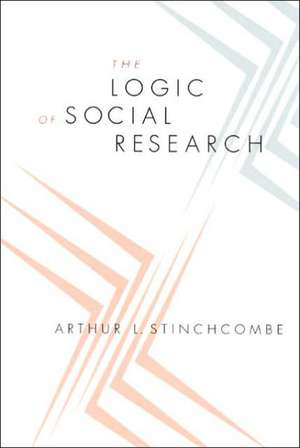The Logic of Social Research
Autor Arthur L. Stinchcombeen Limba Engleză Paperback – 31 oct 2005
Arthur L. Stinchcombe has earned a reputation as a leading practitioner of methodology in sociology and related disciplines. Throughout his distinguished career he has championed the idea that to be an effective sociologist, one must use many methods. This incisive work introduces students to the logic of those methods.
The Logic of Social Research orients students to a set of logical problems that all methods must address to study social causation. Almost all sociological theory asserts that some social conditions produce other social conditions, but the theoretical links between causes and effects are not easily supported by observation. Observations cannot directly show causation, but they can reject or support causal theories with different degrees of credibility. As a result, sociologists have created four main types of methods that Stinchcombe terms quantitative, historical, ethnographic, and experimental to support their theories. Each method has value, and each has its uses for different research purposes.
Accessible and astute, The Logic of Social Research offers an image of what sociology is, what it's all about, and what the craft of the sociologist consists of.
The Logic of Social Research orients students to a set of logical problems that all methods must address to study social causation. Almost all sociological theory asserts that some social conditions produce other social conditions, but the theoretical links between causes and effects are not easily supported by observation. Observations cannot directly show causation, but they can reject or support causal theories with different degrees of credibility. As a result, sociologists have created four main types of methods that Stinchcombe terms quantitative, historical, ethnographic, and experimental to support their theories. Each method has value, and each has its uses for different research purposes.
Accessible and astute, The Logic of Social Research offers an image of what sociology is, what it's all about, and what the craft of the sociologist consists of.
Preț: 264.30 lei
Nou
Puncte Express: 396
Preț estimativ în valută:
50.58€ • 52.25$ • 42.10£
50.58€ • 52.25$ • 42.10£
Carte tipărită la comandă
Livrare economică 26 martie-09 aprilie
Preluare comenzi: 021 569.72.76
Specificații
ISBN-13: 9780226774923
ISBN-10: 0226774929
Pagini: 344
Dimensiuni: 152 x 229 x 30 mm
Greutate: 0.49 kg
Ediția:1
Editura: University of Chicago Press
Colecția University of Chicago Press
ISBN-10: 0226774929
Pagini: 344
Dimensiuni: 152 x 229 x 30 mm
Greutate: 0.49 kg
Ediția:1
Editura: University of Chicago Press
Colecția University of Chicago Press
Notă biografică
Arthur L. Stinchcombe is professor emeritus of sociology, political science, and organizational behavior at Northwestern University. He is the author of many books, including Constructing Social Theories and, most recently, When Formality Works: Authority and Abstraction in Law and Organizations, both published by the University of Chicago Press.
Cuprins
Preface and Acknowledgments
1. Methods for Sociology and Related Disciplines
What Kind of Theory Do Sociologists Study?
The Formation of Methodological Factions
An Outline of the Argument
Problem I: The Centrality of Distances in Study Design for Causal Theories
Problem II: Economy in Data Collection
Problem III: Using Data to Refine Concepts and "Measurements" of Concepts
Problem IV: Contexts; Differences and Distances between Contexts; Contexts Shaping Causal Processes
Problem V: Using Data to Find Mechanisms and Processes; Relation of Such Process Concepts to Concepts of Units of Analysis
Problem VI: Testing Theories by Testing Hypotheses with Data
Problem VII: Using Data to Refine Theories
Self-Evaluation
2. Distances as Central to Causal Reasoning and Methods
The Minimum Piece of Causal Information Is Two Distances
Difference, Distance, Units, Causes within Units
Closer and Farther: Numbers, Lines, and Curves
The Centrality of Distances in Later Chapters of This Book
3. The Basic Structure of Economy in Social Research
The Centrality of Distances in Study Design
Differences among Cultures or Societies
Intensity of Observation
Sparse Fields and the Expense of Getting a Grip on a Case
Stinchcombe Methods Slavery Short Version
Clemens Books Short Version
Theoretical Methods to Increase Economies in Data Collection
Theory Allowing One to Use Data from a "Lower" Level
The Theoretical Penumbra and Exploratory Research
Getting Unconfounded Distances
When Not to Follow my Advice on Sampling Extreme Cases Intensively
"Nearby" Theories and the Value of Data
Process Data
Becker Short Version
Context
Appendix: General Note on American "Random" Samples
4. Using Data to Refine Concepts of Distances between Units of Analysis
"Sensitizing Concepts” and Improving Them
Institutionalized Definitions
"Informal" Institutions
Methodological Implications of the Examples
Extending the Notion
Distances between Situations
Quantitative and Qualitative Distances
Exemplification of Discrete Variables
Stinchcombe Logic of Analogy Short Version
The Opposite End: Exact Concepts
Criteria for Good Concepts with Good Measurements
Stinchcombe Psychology of Rebellion Short Version
Uses of Exactness
Principles of Refining Concepts of Distances
5. Refining Concepts about Contexts
Concepts about Context, and Context-Specific Concepts
Books for Context, Articles for Causation with Assumed Context
Contexts to Study Meanings
The Relation of Context to Distances between Units of Analysis
Periodization and Localization in Historical Sociology
Clemens Time Short Version
Geographical and Temporal Boundaries of Context
Exactness of Concepts of Context; Institutions as Contexts of Organizations
Schneiberg-Clemens Institutionalism Methods Short Version
Concepts and Variables about Contexts
Summary on Concepts of Context
6. Units of Analysis and Mechanisms: Turning Causes into Effects
The Interdependence of Concepts and Units of Analysis
Abbott Short Version
Investigating Analogies and Their Causal Meaning
Analogies between Distances as the Core of Analogies between Units of Analysis
An Example of a Mechanism Paper
Five Main Kinds of Mechanisms and Units of Analysis
Stinchcombe Mechanisms Short Version
A Basic Mechanism with Variants: Complex Cultural Objects, Their Creators, and Their Users
Methodological Strategy on Texts, Discourse, and Reception
Objects and Actions, Griswold and the Artist-Audience Relation
Griswold Short Version
Back to Books versus Articles
Reception versus Production
Scholarly Citations as Evidence of "Serious" Reception
Interpretation
Explanation by Interpretation
Summary: Methods for the Sociology of High Culture
Bargains as Social Systems and Creators of Social Orders
Summary on Bargains
Methods to Study When Bargains Hold
Mobilization as a Mechanism
Social Movement Theory and Diffusion Theory
"Seekers," "Cosmopolitans," "Other Adopters," and "Opponents"
Stinchcombe Time Short Version
Ties of Trust
Adoption and Rejection after Adoption: New Things in the Life World
Comparative Racism: Methods for Sorting Out Mechanisms
Why Historical?
Conclusion
7. Testing Theories by Testing Hypotheses with Data
Regression as Creating a Parameterized Comparison Group, as a "Null Hypothesis" for "Residual Analysis"
A Note on R2
Hierarchical Models
Observations on Partial Distances
Rules of Thumb for Increasing Power of Observations for Causal Studies
Stinchcombe Causes Short Version
Strong Hierarchical Reasoning: Statistical Form
Back to the Residuals Method
The Character of "Resolution" as a Methodological Criterion
Refining Fieldwork Observations
Resolution on a Grand Scale
The "Preferences" of Organizations
Strategic Questions in "Testing" Theories
An Overall View of What These Strategies Do
Variances, Interactions, Boundaries, Scope Conditions and General Complexification
Complexification and Fish Scale Models of Science
Summary on Testing
8. Improving Theories with Data
Theories as Crafted
What Does Crafting Mean?
Crafting Methods
Stinchcombe Slavery Short Version
Stinchcombe Information Short Version
Heimer and Staffen Methods Short Version
Elegance, Power, and Economy
Stinchcombe Rebellion No Answers Short Version
Responsibility
Heimer and Staffen Responsibility Short Version
Complex Causal Roles of Concepts, Complex Concepts, and Complex Fieldwork Studies
Conclusion
1. Methods for Sociology and Related Disciplines
What Kind of Theory Do Sociologists Study?
The Formation of Methodological Factions
An Outline of the Argument
Problem I: The Centrality of Distances in Study Design for Causal Theories
Problem II: Economy in Data Collection
Problem III: Using Data to Refine Concepts and "Measurements" of Concepts
Problem IV: Contexts; Differences and Distances between Contexts; Contexts Shaping Causal Processes
Problem V: Using Data to Find Mechanisms and Processes; Relation of Such Process Concepts to Concepts of Units of Analysis
Problem VI: Testing Theories by Testing Hypotheses with Data
Problem VII: Using Data to Refine Theories
Self-Evaluation
2. Distances as Central to Causal Reasoning and Methods
The Minimum Piece of Causal Information Is Two Distances
Difference, Distance, Units, Causes within Units
Closer and Farther: Numbers, Lines, and Curves
The Centrality of Distances in Later Chapters of This Book
3. The Basic Structure of Economy in Social Research
The Centrality of Distances in Study Design
Differences among Cultures or Societies
Intensity of Observation
Sparse Fields and the Expense of Getting a Grip on a Case
Stinchcombe Methods Slavery Short Version
Clemens Books Short Version
Theoretical Methods to Increase Economies in Data Collection
Theory Allowing One to Use Data from a "Lower" Level
The Theoretical Penumbra and Exploratory Research
Getting Unconfounded Distances
When Not to Follow my Advice on Sampling Extreme Cases Intensively
"Nearby" Theories and the Value of Data
Process Data
Becker Short Version
Context
Appendix: General Note on American "Random" Samples
4. Using Data to Refine Concepts of Distances between Units of Analysis
"Sensitizing Concepts” and Improving Them
Institutionalized Definitions
"Informal" Institutions
Methodological Implications of the Examples
Extending the Notion
Distances between Situations
Quantitative and Qualitative Distances
Exemplification of Discrete Variables
Stinchcombe Logic of Analogy Short Version
The Opposite End: Exact Concepts
Criteria for Good Concepts with Good Measurements
Stinchcombe Psychology of Rebellion Short Version
Uses of Exactness
Principles of Refining Concepts of Distances
5. Refining Concepts about Contexts
Concepts about Context, and Context-Specific Concepts
Books for Context, Articles for Causation with Assumed Context
Contexts to Study Meanings
The Relation of Context to Distances between Units of Analysis
Periodization and Localization in Historical Sociology
Clemens Time Short Version
Geographical and Temporal Boundaries of Context
Exactness of Concepts of Context; Institutions as Contexts of Organizations
Schneiberg-Clemens Institutionalism Methods Short Version
Concepts and Variables about Contexts
Summary on Concepts of Context
6. Units of Analysis and Mechanisms: Turning Causes into Effects
The Interdependence of Concepts and Units of Analysis
Abbott Short Version
Investigating Analogies and Their Causal Meaning
Analogies between Distances as the Core of Analogies between Units of Analysis
An Example of a Mechanism Paper
Five Main Kinds of Mechanisms and Units of Analysis
Stinchcombe Mechanisms Short Version
A Basic Mechanism with Variants: Complex Cultural Objects, Their Creators, and Their Users
Methodological Strategy on Texts, Discourse, and Reception
Objects and Actions, Griswold and the Artist-Audience Relation
Griswold Short Version
Back to Books versus Articles
Reception versus Production
Scholarly Citations as Evidence of "Serious" Reception
Interpretation
Explanation by Interpretation
Summary: Methods for the Sociology of High Culture
Bargains as Social Systems and Creators of Social Orders
Summary on Bargains
Methods to Study When Bargains Hold
Mobilization as a Mechanism
Social Movement Theory and Diffusion Theory
"Seekers," "Cosmopolitans," "Other Adopters," and "Opponents"
Stinchcombe Time Short Version
Ties of Trust
Adoption and Rejection after Adoption: New Things in the Life World
Comparative Racism: Methods for Sorting Out Mechanisms
Why Historical?
Conclusion
7. Testing Theories by Testing Hypotheses with Data
Regression as Creating a Parameterized Comparison Group, as a "Null Hypothesis" for "Residual Analysis"
A Note on R2
Hierarchical Models
Observations on Partial Distances
Rules of Thumb for Increasing Power of Observations for Causal Studies
Stinchcombe Causes Short Version
Strong Hierarchical Reasoning: Statistical Form
Back to the Residuals Method
The Character of "Resolution" as a Methodological Criterion
Refining Fieldwork Observations
Resolution on a Grand Scale
The "Preferences" of Organizations
Strategic Questions in "Testing" Theories
An Overall View of What These Strategies Do
Variances, Interactions, Boundaries, Scope Conditions and General Complexification
Complexification and Fish Scale Models of Science
Summary on Testing
8. Improving Theories with Data
Theories as Crafted
What Does Crafting Mean?
Crafting Methods
Stinchcombe Slavery Short Version
Stinchcombe Information Short Version
Heimer and Staffen Methods Short Version
Elegance, Power, and Economy
Stinchcombe Rebellion No Answers Short Version
Responsibility
Heimer and Staffen Responsibility Short Version
Complex Causal Roles of Concepts, Complex Concepts, and Complex Fieldwork Studies
Conclusion

















